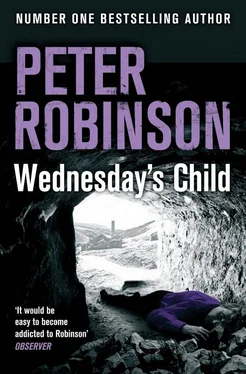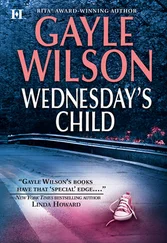Peter Robinson - Wednesday's Child
Здесь есть возможность читать онлайн «Peter Robinson - Wednesday's Child» весь текст электронной книги совершенно бесплатно (целиком полную версию без сокращений). В некоторых случаях можно слушать аудио, скачать через торрент в формате fb2 и присутствует краткое содержание. Год выпуска: 2006, ISBN: 2006, Издательство: Penguin Canada, Жанр: Полицейский детектив, на английском языке. Описание произведения, (предисловие) а так же отзывы посетителей доступны на портале библиотеки ЛибКат.
- Название:Wednesday's Child
- Автор:
- Издательство:Penguin Canada
- Жанр:
- Год:2006
- ISBN:978-0-14-305219-7
- Рейтинг книги:5 / 5. Голосов: 1
-
Избранное:Добавить в избранное
- Отзывы:
-
Ваша оценка:
- 100
- 1
- 2
- 3
- 4
- 5
Wednesday's Child: краткое содержание, описание и аннотация
Предлагаем к чтению аннотацию, описание, краткое содержание или предисловие (зависит от того, что написал сам автор книги «Wednesday's Child»). Если вы не нашли необходимую информацию о книге — напишите в комментариях, мы постараемся отыскать её.
Wednesday's Child — читать онлайн бесплатно полную книгу (весь текст) целиком
Ниже представлен текст книги, разбитый по страницам. Система сохранения места последней прочитанной страницы, позволяет с удобством читать онлайн бесплатно книгу «Wednesday's Child», без необходимости каждый раз заново искать на чём Вы остановились. Поставьте закладку, и сможете в любой момент перейти на страницу, на которой закончили чтение.
Интервал:
Закладка:
She stared at the large TV screen and saw her own reflection distorted through her tears. She remembered the interview she had watched over and over again. Vanity. Madness. It had all been madness. In a sudden burst of rage, she drew back her arm and flung her mug as hard as she could at the screen.
IV
Just a few hours ago the wind had been cool, and there had been only enough blue sky to make baby a new bonnet. Now, as Banks and Susan drove to Harkness’s, the wind had dropped, the sun had come out and the afternoon had turned out fine. Gristhorpe had been out when Banks went to find him, so he had left a message and found Susan, who happened to be in the corridor at the time.
Enjoying probably the last fine weekend of the season, families sat out on the green at Fortford eating picnics, even though it wasn’t particularly warm and the grass must still be damp. Banks turned right on the Lyndgarth road, and as they approached the bridge, they saw even more people ambling along The Leas or sitting on the riverbank fishing.
Banks drove in silence, tense and angry over the forthcoming confrontation. They turned in the drive just before the old pack-horse bridge, and the car flung up gravel as they stopped. They had no evidence, he reminded himself, only supposition, and everything depended on bluffing and scaring Harkness into blabbing. It wouldn’t be easy; it never was with those so used to having things their own way. Piet’s information wasn’t anywhere near enough to get him in court. But Harkness had known Johnson, and Johnson had known Chivers. Jenny said the paedophile was likely to be over forty, lived alone, and probably knew Gemma. Well, Harkness hadn’t known Gemma, but he could have heard of her through Johnson and Chivers. It made sense.
After the conversation, Banks had checked the time and, finding they were only two hours ahead, tried the South African police again. They still had nothing to report, and he got the impression they were dragging their feet. He could only speculate on the nature of the crime there, and on the depth of the cover-up. He had tried Linda Fish from the Writers’ Circle again, too, but she had heard no more from her writer friend. He had felt too edgy simply to wait around for more information to come in.
Harkness answered the door at the first ring. He seemed nervous to see them, Banks thought, fidgety and too talkative as he led them this time into the living-room and bade them sit.
“Have you found out who killed Carl?”
“We’re looking for a man called Jeremy Chivers,” Banks said. “Someone Johnson knew. Did he ever mention the name?”
“Let’s not go through all that again.” Harkness walked over to the mantelpiece. “Who is this Chivers?”
“A suspect.”
“So why have you come to pester me again?”
Banks scratched the little scar by his right eye. It wasn’t always reliable, but it did have a tendency to itch in warning when he hadn’t quite realized that something was wrong. “Well, I’ll tell you, Mr Harkness. I’ve just had a chat with a friend of mine on the Amsterdam police, and he told me some very odd things.”
“Oh?”
“Yes. You lived there for some time, didn’t you?”
“Yes, you know I did. But I can assure you I never came into contact with the police.”
“Clever there, sir, weren’t you?” said Susan suddenly.
Harkness looked from one to the other, reddening. “Look, what is this?” he said. “You can’t just come in here—”
Banks waved him to silence, ready to make his accusation. But just before he opened his mouth to speak, he paused. Something was definitely bothering him. Even now, he didn’t know what it was: tension in the air, a feeling of déjà vu, or that little shiver when someone steps on your grave. It would come. He went on, “Everyone knows you can get anything you want in Amsterdam. If you know where to go. If you can pay for it.”
“So what? It’s hardly different from any other city in that way, I should think.” Harkness paced, hands in his pockets.
“True,” said Banks, “though it does have something of a reputation for sex in various forms, straight and other.”
“What are you suggesting? Get to the point.”
“That’s just it. We have information leading us to believe that you frequented a brothel. A very special kind of brothel. One that made young children available to its customers.”
“What! This is monstrous. I’ve already told you the Assistant Chief Commissioner is a good friend of mine, the Commissioner, too. If you don’t take back your slanderous allegations, I’ll make sure you’re out of the force before bedtime tonight. Damn it, I think I’ll do it anyway.”
“I don’t think so,” said Banks. “The Commissioner is particularly upset about this case. He has grandchildren the same age as Gemma Scupham, so I don’t think the fact that you belong to the same golf club will cut a lot of ice with him, sir.”
“But this is preposterous! You can’t possibly be suggesting that I had anything to do with that?”
“Well, I—” Banks stopped, suddenly aware of what was bothering him. He shot Susan a quick glance and stood up. Looking puzzled, she followed suit. “Probably not,” he said, “but I had to find out. I’m sorry, Mr Harkness. I just wanted to test your reaction to the allegations.”
“You’ve got a damned nasty way of going about your business, Banks. I most certainly will be talking to your superior.”
“As you wish.” Banks followed Susan to the door. “But please understand, we have to follow every lead, however incredible, however distasteful. I’m very sorry to have bothered you, sir. I think I can safely say we won’t be troubling you again.”
“Well…” Harkness looked confused. He opened his mouth as if to complain more, then seemed to think better of it, realizing they were leaving, and stood there gulping like a fish. “I should damn well think so,” he muttered finally. “And don’t think I don’t mean it about talking to the Commissioner.”
“What is it?” Susan asked as they drove back onto the road. “Sir? Why did you do that?”
Banks said nothing. When they were out of sight of the house, about half a mile down the road, hidden by the roadside trees, he pulled into a lay-by.
“What is it?” Susan asked again. “I picked up signal to get out, but why? You were rattling him. We could have had him.”
“This is the third time I’ve visited Harkness,” Banks said slowly, hands still gripping the wheel. “Both times before the place has been a bit of a mess — dusty, untidy, a typical bachelor dwelling.”
“So?” said Susan. “He’s had the cleaning lady in.”
“I don’t think so. He said he didn’t employ one. Notice how clean the surfaces were, and that silver goblet on the coffee-table?”
“Yes. Polished so you could see your face.”
“You weren’t there,” Banks said, “but it’s the same polish smell as in the Weymouth hotel room, something with a strong scent of pine.”
“You can’t be thinking… surely?”
Banks nodded. “That’s just what I am thinking, Susan. We’ve got to radio for help.” He gestured with his thumb back towards the house. “I think Chivers is in there somewhere, and he’s armed.”
FOURTEEN
I
To the casual observer, nothing unusual occurred around The Leas and Devraulx Abbey that fine Sunday afternoon in late September. If one fisherman approached another, had a chat, then replaced him at the riverbank, or if a picnicking family, shortly after having a few words with a passing rambler complete with rucksack and stick, decided to pack up and leave because the wasps were bothering them, then what of it? The Abbey closed early, and there were a few more cars on the road than usual, but then, it was such a surprisingly beautiful afternoon that everyone wanted to enjoy a bit of it before the rain and wind returned.
Читать дальшеИнтервал:
Закладка:
Похожие книги на «Wednesday's Child»
Представляем Вашему вниманию похожие книги на «Wednesday's Child» списком для выбора. Мы отобрали схожую по названию и смыслу литературу в надежде предоставить читателям больше вариантов отыскать новые, интересные, ещё непрочитанные произведения.
Обсуждение, отзывы о книге «Wednesday's Child» и просто собственные мнения читателей. Оставьте ваши комментарии, напишите, что Вы думаете о произведении, его смысле или главных героях. Укажите что конкретно понравилось, а что нет, и почему Вы так считаете.












